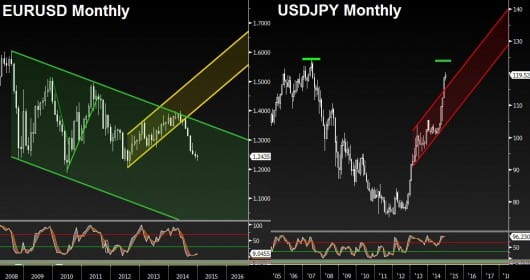Euro boosted by ECB status quo USD awaits NFP
The euro rallied across the board as the ECB stopped short of announcing additional stimulus in the way of purchasing sovereign bonds. The euro’s decline […]
The euro rallied across the board as the ECB stopped short of announcing additional stimulus in the way of purchasing sovereign bonds. The euro’s decline […]
The euro rallied across the board as the ECB stopped short of announcing additional stimulus in the way of purchasing sovereign bonds. The euro’s decline was more a case of markets expecting the ECB would hint at sovereign bonds purchases, rather than the ECB having announced something different. But the only difference from last month’s meeting was a string of sharp downward revisions in Eurozone growth and inflation. Meanwhile, USD bulls brace for an upside surprise in tomorrow’s US jobs report to alleviate today’s bruising of the greenback.
The ECB further downgraded its outlook for GDP growth and inflation for 2014 into 2016, possibly as a way to convince the anti-QE members of the Governing Council that further action will be needed. The inflation revisions for 2014, 2015 and 2016 are as follow: 0.5% from 0.6%; 0.7% from 1.1%; and 1.3% from 1.4%. Downward revisions for growth are: 0.8% from 0.9%; 1.0% in 2015 from 1.6%; and 1.5% in 2016 from 1.9%.
Unlike in the first half of the year, when the ECB considered falling inflation to be transitory and temporary, the 0.3% rate is painfully close to qualifying as disinflation, in which case the central bank’s reflationary policy ought to be pre-emptive. Falling prices have already dropped by 40%. Chances that they will recover half of the decline anytime soon are marginal at best.
The ECB’s decision to refrain from outright QE of government bonds should not have been a complete surprise, as it made clear over the past two months that it preferred to assess the take-up of the second targeted long-term refinancing operation (TLTRO-2), due on Dec 11, before deciding on the extent to which it will increase its balance sheet with purchases of other bonds.
The first round of TLTRO had produced a disappointing take-up of €82.6 bn. The ECB also purchased €368 mn in asset-backed securities so far, and €17.8 bn in covered bonds.
As the ECB assesses the impact of TLTRO-2, purchases of ABS and covered bonds, it may delay any decision to purchase sovereign bonds to February, or March, depending primarily on the deterioration in CPI.
Corporates and agencies come before sovereign bonds
Until then, the ECB has yet to buy corporate bonds and agency bonds (bonds from international and supranational agencies such as the European Investment Bank) so as to expand the pool of eligible assets, without facing the legal and political hurdles of buying sovereign debt. Now that the ECB has completed its review of banks’ balance sheets in November, it may offer less stringent conditions at this month’s TLTRO in order to improve the attractiveness of the take-up. Most private economists expect the ECB to start purchasing sovereign bonds starting in the first quarter of 2015, but not before Draghi snapped up corporates and agencies.
Tomorrow’s release of November non-farm payrolls is expected at 230K from 214k, with the unemployment rate holding at six-year lows of 5.8%. Last month’s disappointment from the lower-than-expected October release of 214,000 in NFP was offset by further declines in the unemployment rate. The uptick in labour participation to 62.8% from 62.7%, and the fall in the in the underemployment rate to 11.5% from 11.8%, helped alleviate concerns that the declining jobless rate was caused by lower participation in the labour force.
With the ECB out of the way for the rest of the year and the Fed awaited later this month, the risk for further upside moves in EUR/USD towards the 55-week moving average of $1.2597 remains considerable. Regardless of whether tomorrow’s NFP figure comes up above 280,000 or disappoints below 200,000, the Fed is likely to place more emphasis on slowing inflation at this month’s FOMC meeting. Such dynamics will contribute to providing EUR/USD with a temporary floor near $1.2300, while capping the gains at $1.2600.
Having already broken above 120.00 today for the first time since July 2007, the pair is positioned for further gains towards 122.70s, as long as Friday’s report avoids any negative shocks (such as sub-150k NFP and/or above 6.1% jobless rate). The more dominant dynamic for USD/JPY remains the December 14 elections in Japan, and whether the ruling LDP succeeds in securing a fresh four-year cycle from December to guarantee Abenomics’ hold over the four arrows of stimulative policy. As was seen in the December 2013 elections, an Abe vote would be fresh support for USD/JPY as it means more asset purchases from the Bank of Japan to achieve the elusive 2.0% inflation target.
